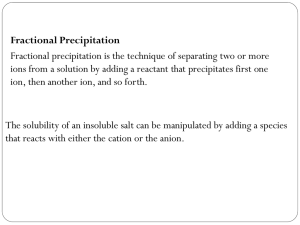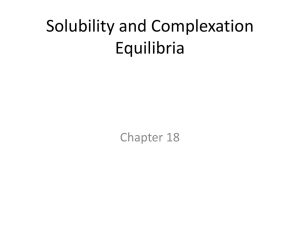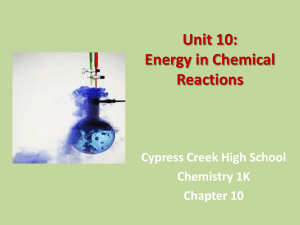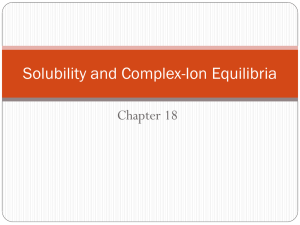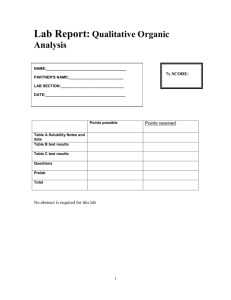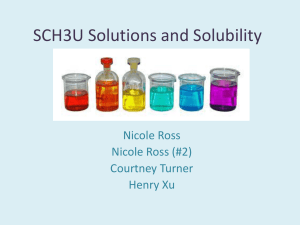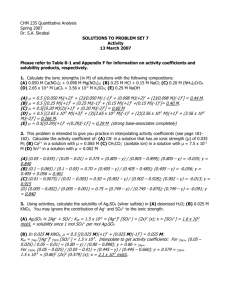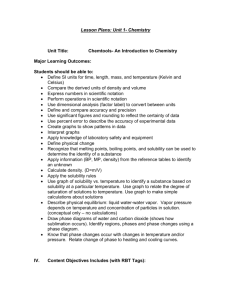Solubility
advertisement
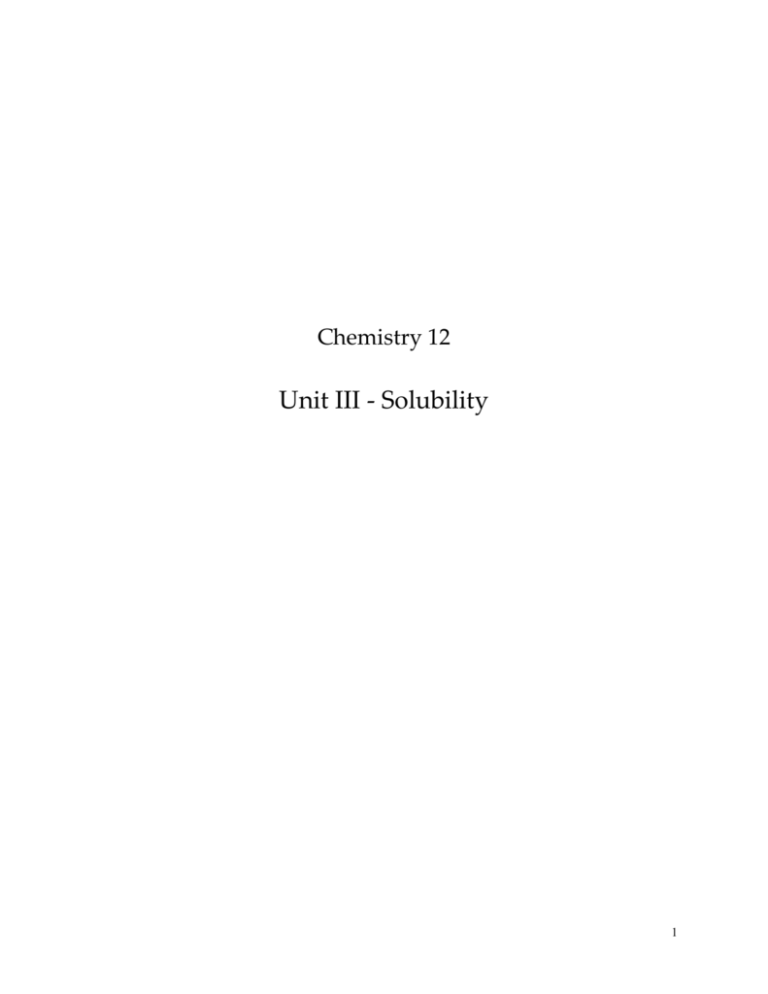
Chemistry 12 Unit III - Solubility 1 I) Ionic & Covalent Solutions What is a solution? What are some examples of different types solutions? Solid-solid: Liquid-solid: Liquid-liquid: Liquid-gas: Gas-gas: Solutions are made up of solute(s) and a solvent. Define each: Solute: Solvent: What is the difference between an ionic solution and a covalent solution? How does a solid salt such as NaCl(s) dissolve in water? When a salt dissolves in water, it can be described as dissolving, but a more accurate term is dissociation. Why? NaCl(aq) is commonly used to depict table salt in solution (after dissociation has occurred). How come this is inaccurate? 2 Example dissociation equation for a salt: NaCl(s) *In the solubility unit, always include states when writing equations Compounds that contain polyatomic ions are obviously ionic in nature (they are salts) and would dissociate in water to form ions. Write the dissociation equation for K2CO3(s) dissolving in water: Ions in solution are called __________________. They are what allow an ionic solution to ________________________________________________. What is a covalent compound (also called ‘molecular compound’) composed of? What is different about covalent compounds when they dissolve compared to ionic compounds? Diagram of a covalent compound (sugar in this case) dissolving in water: 3 Write the dissolving equation for the covalent sugar compound: C6H12O6(s) Write the dissolving equation for CH3OH (methanol) in water: Do molecular (covalent) solutions conduct? Why or why not? What do we call dissolved molecular compounds? How can you tell the difference between ionic and covalent compounds? II) Solubility What is a saturated solution? How can you recognize a saturated solution visibly? *If the excess undissolved solute is filtered off, you can still have a saturated solution with no visible undissolved solute on the bottom What kind of system is a saturated solution? Is a saturated solution static or dynamic? Therefore, does the amount of undissolved salt at the bottom of the solution change? Write a saturated solution equation for KBr: 4 Explain the difference between the rate of dissolving and the rate of precipitation for an unsaturated solution: Write an unsaturated equation for KBr: What’s another name for the equation above? How do the saturated and unsaturated equations differ? Solubility: the solubility of a substance is a quantitative value. What is it? Therefore, solubility can only be measured for what types of solutions? What is ‘concentration’ in chemical terms? Concentration is most commonly measured using what unit? Concentration can also be measured using mass of solute per volume of solution, as you’ll see in some examples. Every salt dissociates to some extent in water, but every salt has a different solubility in water. What does this mean? 5 Some salts can dissociate to a larger extent in water before becoming saturated. These salts are called __________________ salts. Some salts dissociate only very little in water before saturating. These salts are called _________________________ salts. Solubility is also temperature dependent. A general rule for solid/liquid solutions is that solubility increases with increasing temperature. Assignment 1: Read Hebden pages 73-76 (check out the comic on p.76) and do Questions #1-5 III) Calculating Solubility and Ion Concentrations Use stoichiometry to calculate the concentration of ions given the concentration of solute. Calculate [Na+] and [SO42-] in a 0.20M solution of Na2SO4(aq) Dissoc eqn: Na2SO4(s) 2Na+(aq) + SO42-(aq) 0.20M _____ ______ Calculate [Fe3+] and [SO42-] in a 0.50M solution of iron III sulphate: A saturated solution of PbCl2 is found to contain 9.90g of PbCl2 per litre of solution. Find [Pb2+]. Write an equation showing the equilibrium in a saturated solution of silver carbonate. The solubility of silver carbonate is 1.29 x 10-4 M. Find [Ag+] in grams per litre. 6 A 558mL solution of Al2(SO4)3 has a concentration of 0.0342M. You then add 325mL of water to it. What is the new concentration? 250mL of 0.30M K2SO4 and 250mL of 0.80M MgCl2 are mixed, and no precipitate forms. Calculate the concentration of each ion in the final solution. Assignment 2: Hebden p.77 # 8, 9 & p.78 #13 & p.81 #18a-d, 20abfg IV) Using the Solubility Table The solubility table in the data booklet is used to predict whether a salt is soluble in water or low solubility in water. Soluble salts can dissociate and produce a solution of at least 0.1M before becoming saturated. Low Solubility salts dissociate very little as they become saturated before reaching 0.1M. 7 Identify three soluble salts, and three low solubility salts using the table: SOLUBLE LOW SOLUBILITY If two ions (a cation and an anion) that are low solubility with one another are put into the same solution, and the resulting concentrations of these ions exceed the solubility (molarity at saturation) for that salt, then some of those cations & anions will precipitate out of solution. Is it possible that a low solubility salt may not precipitate? Is it possible that a soluble salt could precipitate? There are two ways you can create a saturated solution for a salt. Explain two ways that a saturated solution of PbCl2 could be created: 8 1) Direct Method: 2) Indirect Method: Use your table to predict whether each salt is soluble or low solubility: 1. sodium hydroxide 2. calcium sulphate 3. ammonium phosphate 4. rubidium sulphide 5. copper (I) iodide 6. copper (II) chloride 7. iron (II) sulphide 8. strontium hydroxide 9. magnesium sulphite 10. barium hydroxide i) Will a precipitate form if equal volumes of the following 0.2M solutions are mixed? Pb(NO3)2(aq) + KI(aq) ii) Which 1.0M soluble solutions could be mixed in order to produce a precipitate of Mg(OH)2? 9 Assignment 3 1) Describe the difference between a soluble salt and a low solubility salt. 2) If you mix two solutions together, and a low solubility ion combination results, explain when a precipitate would form and when it wouldn’t. 3) Hebden p.83 #21, 22 4) Hebden p.84 #24 V) Formula, Complete Ionic, and Net Ionic Equations These equations describe the process of mixing two soluble solutions together. Suppose 0.2M CaCl2(aq) is mixed with an equal volume of 0.2M AgNO3(aq). Write the formula, complete ionic, and net ionic equations. Formula Equation (double replacement equation): Complete Ionic Equation: The formula equation is inaccurate for the most part, as the salts dissociate into ions in solution. This is reflected in the complete ionic equation. Net Ionic Equation: Only ions that react are part of the Net. The example we did involved one low solubility ion combination. Sometimes, no low solubility ion combinations result. Sometimes, both ion combinations are low solubility. 10 Assignment 4: For each of the following, write formula, complete, and net ionic equations: 1. Aqueous magnesium chloride is mixed with aqueous potassium hydroxide. 2. Aqueous lithium carbonate is mixed with aqueous iron (II) sulphate. 3. Aqueous copper I sulphate is mixed with aqueous strontium bromide. 4. Hebden p. 87 #25e,i VI) Separating Mixtures of Ions by Precipitation Describe a method to separate Ba2+ and Pb2+ ions which are in solution together: Assignment 5: Ion Separation Exercises 1. Describe a method to separate Cl- and OH- that are in solution together. 2. A solution is known to contain Mg2+, Ca2+, and Pb2+. Describe a method to separate the cations. 3. You have a solution known to contain any or all of Cu+, Ca2+, Fe3+, and Sr2+. You have the following 'test' solutions available: 1M Na2CO3, 1M NaOH, 1M NaCl, 1M Na2S. What order would you add each to test for each cation? 4. Hebden p. 90 #28, 31, 32 VII) Quantitative Solubility A saturated solution is at equilibrium because the rate of __________________ equals the rate of ____________________. Example: BaSO4(s) Ba2+(aq) + SO42-(aq) Since equilibrium exists, we can work with an equilibrium constant (Keq). The equilibrium constant for a saturated solution is called a Ksp. Write the Ksp equation for BaSO4: 11 The ‘sp’ from Ksp stands for _______________________________________. The word ‘product’ is mathematical. A product is the result of a multiplication. Ksp equations only contain multiplication (no division) because since the solid is always written on the left of the saturated solution equation, there will never be a denominator for the Ksp equation. BaSO4(s) Ba2+(aq) + SO42-(aq) Solid on left; not Included in Ksp equation Write the saturated solution equations (solid on left) and the respective Ksp equations for Ca(OH)2 and Ag3PO4. Do soluble salts have large or small Ksp constants? Why? What about low solubility salts? Notice that the Ksp table in the data booklet (p.5) only lists Ksp constants for low solubility salts. Notice they are all small values (much less than 1), as they should be. 12 VIII) Type A Problems: Calculating Ksp Ksp constants can be calculated for soluble or low solubility salts, as long as a there is information available about the respective saturated solution. Example: 1. If the solubility of Ag2S in water is 1.3 x 10-17M, calculate the Ksp. Example: 2. Calculate the Ksp of MgS if a maximum of 300.0g can be dissolved in 2.00L of water. 13 3. A 25.00mL sample of a ZnF2 saturated solution has the excess solid filtered off. Then, the solution is evaporated to dryness. The mass of the ZnF2 salt that remained was 0.508g. Calculate the solubility product constant ZnF2. Assignment 6: Type A Exercises 1. At 25C, only 0.00245g of BaSO4 can be dissolved in 1.0L of H2O. Calculate the Ksp for BaSO4. 2. At 25C, the solubility of Ag3PO4 is 1.8 x 10-5M. Calculate the Ksp for Ag3PO4. 3. An experiment showed that a maximum of 1.49g of AgBrO3 can dissolve in 1.00L of water at 25C. What is the Ksp for AgBrO3 at this temperature? 4. A saturated solution of CaF2 contains 4.15 x 10-4mol of CaF2 in 2.0L of solution. What is the Ksp for CaF2? 5. A solution in equilibrium with solid Ag2S on the bottom of the beaker was found to contain 1.6 x 10-16M S2- and 2.5 x 10-18M Ag+. Calculate the solubility product constant of Ag2S. 14 IX) Type B Problems: Calculating Solubility In Type B problems, you must calculate the solubility of a salt using the Ksp constant from p.5 of the data booklet. Remember that solubility is the molarity at saturation. Example: 1. Calculate the solubility of CaCO3 in water at 25C. 2. Calculate the solubility of PbI2 in g/L. 15 3. How many grams of PbBr2 can be dissolved in 250.0mL of water at 25C? Assignment 7: Type B Exercises 1. The Ksp at a certain temperature for Ni(OH)2 is 1.6 x 10-16. Calculate the solubility of Ni(OH)2. 2. Find the solubility of CaSO4 in g/L. 3. Which saturated solutions at 25C will have a greater [Ag+], AgCl or Ag2CO3? 4. Calculate the mass of MgCO3 which could be dissolved in 3.0L of water at 25C. 16 X) Type C Problems: Trial Ksp When two soluble solutions are mixed, a cation from one solution is introduced to an anion from the other solution, and visa versa. One or both of the new ion combinations (cation and anion) could have low solubility. If this is the case, and there are too many of the low solubility ions present (more than what is necessary for a saturated solution), a precipitate will result. If there are not enough of the low solubility ions present to reach the saturation concentration, a precipitate will not form and the ions will stay dissolved in solution. A Trial Ksp (same concept as a trial Keq) can be calculated for these mixtures to deduce whether a precipitate will form or not when the two solutions are mixed. If the trial Ksp is larger than the actual Ksp, the concentrations of low solubility ions is greater than saturation, so a precipitate will result. If the trial Ksp is smaller than the actual Ksp, the concentrations of low solubility ions has not yet reached saturation, therefore a precipitate will not form. Example: 1. Will a precipitate form if 40.0mL of 8.0 x 10-3M Mg(NO3)2 is mixed with 60.0mL of 1.0 x 10-2M K2CO3 ? Mg(NO3)2(aq) + K2CO3(aq) 17 Example: 2. Will a precipitate form if 50.0mL of 0.00100M CaCl2 is added to 50.0mL of 0.0100M Na2SO4 ? Assignment 8: Type C Exercises 1. Will a precipitate form when 1.0L of 3.0 x 10-10M Zn(NO3)2 is added to 1.0L of 2.0 x 10-11M Na2S ? 2. Will a precipitate form when 2.0L of 6.7 x 10-3M SrS is added to 1.0L of 4.3 x 10-4M K2SO4 ? 3. Will a precipitate form when 1.0L of 5.0 x 10-4M MgCl2 is added to 1.0L of 2.0 x 10-2M Na2CO3 ? 18 XI) Type D Problems: Determining the Concentration of a Specific Ion in a Saturated Solution Recall that there are two ways to make a saturated solution: the direct method and the indirect method. Explain each using Pb(OH)2 as an example. 1. Direct Method: 2. Indirect Method: It is important to recognize that ion stoichiometry for a saturated solution is only a reality when the saturated solution is made from dissolving the salt in water directly. What would be the proportion of [OH-] compared to [Pb2+] in this case? If a saturated solution of a salt is made by combining two different solutions (indirectly), the [Pb2+] relative to the [OH-] could be anything, depending on the molarities of the solutions mixed. Therefore, you can’t rely on 2 OH- to 1 Pb2+ stoichiometry because the ions came from different solutions. However, the Ksp can still be relied upon, as you’ll see in Type D problems. Example: 1. What is the maximum [Sr2+] that can be dissolved in a 0.020M solution of K2SO4 without a precipitate of SrSO4 forming? 2. If Cu2+ is slowly added to a solution of 0.020M KIO3, at what [Cu2+] does a precipitate of Cu(IO3)2 just start to form? 19 Example: 3. Fe(NO3)2 is slowly added to a 2.0L solution of 0.010M Na2S. What mass of Fe(NO3)2 would be required to just start precipitation? Example: 4. Removing pollution by precipitation: Waste water from a mining operation was found to have a [Cd2+] exceeding environmental standards. Before discharging the water into an adjacent river, the [Cd2+] in the tank must be lowered to 1.0 x 10-5M. What [OH-] would be required to bring the [Cd2+] to an acceptable level? Ksp = 2.2 x 10-14 for Cd(OH)2 Assignment 9: Type D Exercises 1. What [S2-] must be present to just start precipitation from a 0.20M solution of CuCl2 ? 2. What [Cu2+] would be required to just start precipitation of Cu(IO3)2 from a 0.20M solution of KIO3 ? 20 3. AgNO3 is added to a 0.10M solution of NaCl. What [Ag+] must be present in order to observe a precipitate? 4. What is the maximum [SO42-] that can be present in 0.010M CaBr2 solution without a precipitate forming? 5. What [Ba2+] must be present to just start a precipitation in a 5.0 x 10-4M solution of K2CrO4 ? XII) Hard Water Hard water is caused by a high concentration of __________ and/or ___________ ions in water. It’s a problem in areas of the world rich in limestone (CaCO3) and/or magnesite (MgCO3). Water from rivers, lakes, and streams pass over limestone rock, and Ca2+ ends up in water by two processes. Hard water is not harmful to health, but can cause pipes to clog and hinders soap from creating suds: Ca2+ + NaC17H35COO Ca(C17H35COO)2 + 2Na+ soap soap scum 1. Permanent Hard Water is formed by acidic water (water containing H+) due to acid rain. It is deemed ‘permanent’ because the reaction is not reversible: CaCO3(s) + 2H+(aq) Ca2+(aq) + H2O(l) + CO2 How do you soften permanently hard water? 2. Temporary Hard Water is due to the CO2 dissolved in regular rainwater. It is deemed ‘temporary’ because it’s a reversible reaction CaCO3(s) + CO2(aq) + H2O(l) Ca2+(aq) + 2HCO3-(aq) + heat How do you soften temporary hard water? Assignment 10: Read Hebden p. 103 & 104 and do p. 104 #76-80 XIII) Altering the Solubility of a Salt Saturated solution equations (solid on the left, ions on the right) are simply equilibrium equations. In the equilibrium unit, we studied how 21 concentration changes cause a shift. AgCl(s) Ag+(aq) + Cl-(aq) What shift would occur if [Ag+] is increased? How would the amount of AgCl(s) change? Since more AgCl(s) is being produced, we can say that the ‘solubility of AgCl’ has __________________________. By adding more Ag+ to increase [Ag+] or more Cl- to increase [Cl-], the equilibrium shifts _________________, resulting in more AgCl(s) . This is called the ________________________________, because an ion that is already part of the equilibrium (common to the equilibrium) is being added. Keep in mind that Ag+ would be added with a spectator anion such as NO3-, and Cl- would be added with a spectator cation, such as Na+. What kind of concentration change would have to occur to cause a shift right? Thus, you must add an ion that will be low solubility, and hence precipitate out either Ag+ or Cl-. What ion could you add (with applicable spectator) to precipitate out Ag+? What ion could you add (with applicable spectator) to precipitate out Cl-? Either of these methods would cause a shift right, causing more AgCl(s) to dissolve, thereby ____________________ the solubility of AgCl. 22 Example: 1. In which of the following 0.10M solutions would CaC2O4 be least soluble in and most soluble in: NaOH, KCl, Ca(NO3)2? Start by writing an equilibrium reaction for calcium oxalate. 2. In which of the following 0.10M solutions would PbCl2 be least soluble? HCl, MgCl2, AgNO3, NH4NO3 Assignment 11: 1. In which of the following 0.10M solutions would Sr(OH)2 be least soluble in? A. Sr(NO3)2 C. NaCl B. MgS D. KBr 2. In which of the following 0.10M solutions would NaCl be most soluble in? A. H2O C. NH4Cl B. AgNO3 D. HNO3 3. Hebden p. 108 #81, 82, 84-86 23
